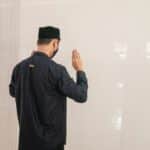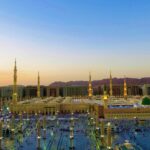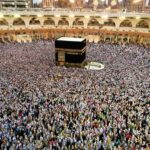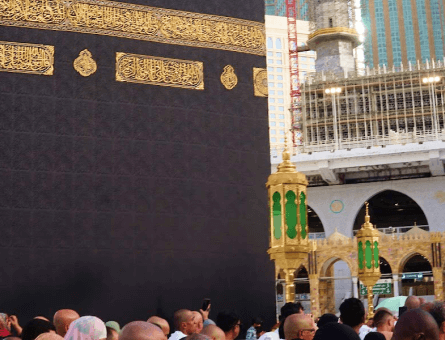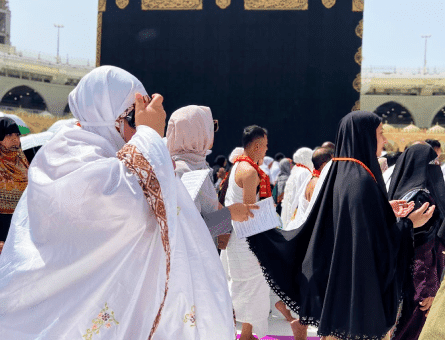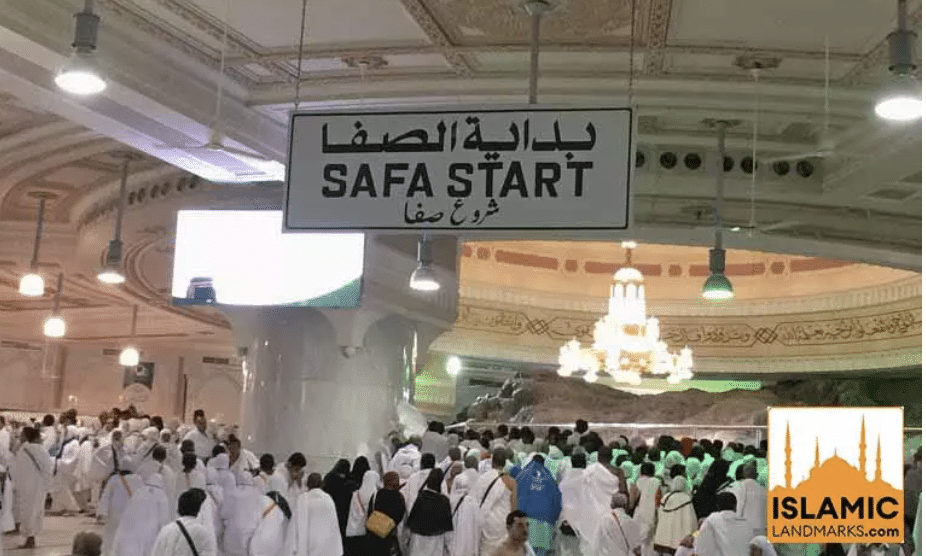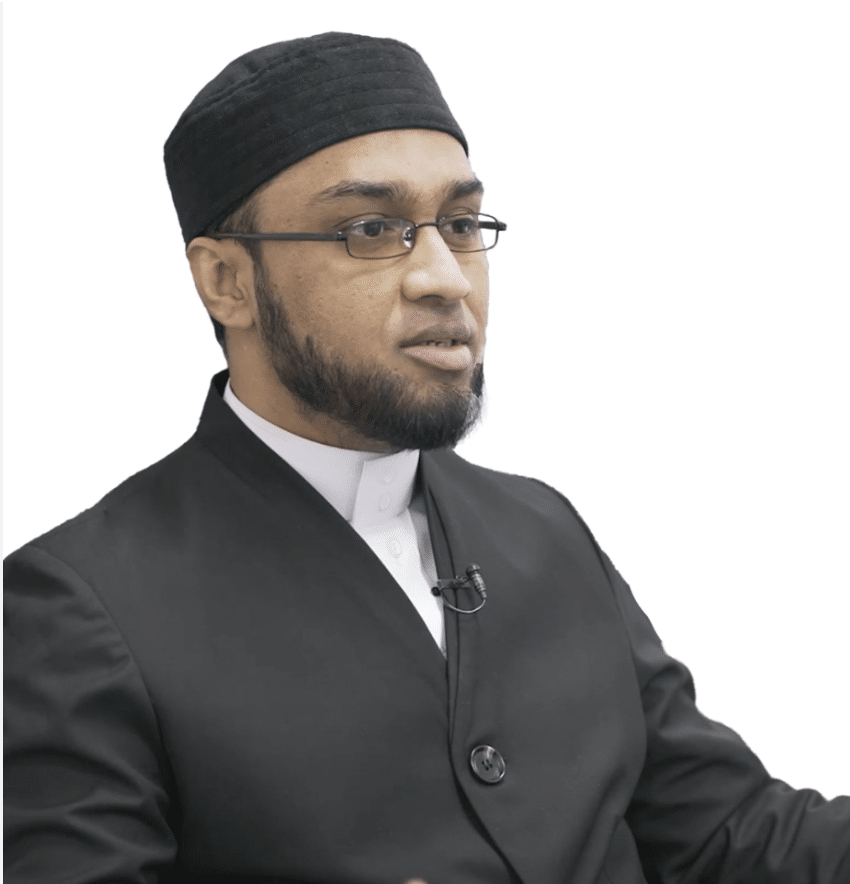The Story of Prophet Ismail (AS) in Islam
Referred to as “Ishmael” (one of the great prophets of God who lived in Hejaz) in the Quran, Prophet Ismail (AS) is the firstborn of Prophet Ibrahim (AS) and the messenger, prophet and founder of the Ishmaelites in Islam. In this article, we will be covering the life story of Prophet Ismail (AS) and his significance in Islam.
Who Was Prophet Ismail (AS)?
Prophet Ismail (AS) was the son of Prophet Ibrahim (AS) and Hajar (RA). In Islam, Prophet Ismail (AS) is regarded as the ancestor of Prophet Muhammad (PBUH) and a devoted messenger of Allah SWT. The inspiring stories of the life of Prophet Ismail (AS) aren’t only mentioned in the Quran but also in the religious books of Christianity and Judaism.
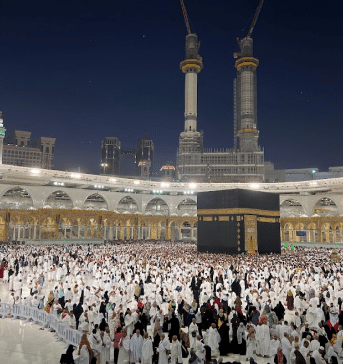 Even though the life of Prophet Ismail (AS) was filled with hardships, he was a true worshipper of Allah SWT and the loving son of Prophet Ismail (AS). Whether it was agreeing to sacrifice himself for Allah SWT or being by his father’s side during the construction of the Holy Kaaba, Prophet Ismail (AS) is an inspiration to all Muslims today and for generations to come.
Even though the life of Prophet Ismail (AS) was filled with hardships, he was a true worshipper of Allah SWT and the loving son of Prophet Ismail (AS). Whether it was agreeing to sacrifice himself for Allah SWT or being by his father’s side during the construction of the Holy Kaaba, Prophet Ismail (AS) is an inspiration to all Muslims today and for generations to come.
What Was Special about Prophet Ismail (AS)?
Prophet Ismail (AS) was the raiser of the Holy Kaaba and the Father of the Arabs. From a very young age, Prophet Ismail (AS) devoted his life to preaching Islam and fulfilling the commandments of Allah SWT.
From being left alone in the desert with Hajar (RA) when Prophet Ismail (AS) was only an infant, to allowing his father (Prophet Ibrahim (AS)) to sacrifice him for the sake of Allah SWT, to raising the foundation of the Holy Kaaba, Prophet Ismail (AS) has proven himself as a devoted messenger of Islam, time and again.
Prophet Ismail (AS) lived in Makkah throughout his life. One day, Prophet Ibrahim (AS) came to him and said, “O Ismail, Allah SWT had given me an order.”
Prophet Ismail (AS) asked, “Do what your Lord has ordered you to do.” Upon hearing this, his father asked, “Will you help me?” Prophet Ismail (AS) answered, “I will help you.” Just then, while pointing to a hillock that was higher than the surrounding area, Prophet Ibrahim (AS) said, “Allah SWT has ordered me to build a house here.” (Surah Saffat)
The father and son duo then raised the foundation of the Holy Kaaba. Throughout the construction process, Prophet Ismail (AS) was responsible for bringing the stones, while Prophet Ibrahim (AS) placed them over one another. According to narrations, it was Prophet Ismail (AS) who brought the magical stone that is placed at Maqam-e-Ibrahim (Station of Ibrahim).
Narrating this incident, Allah SWT in the Quran states, and remember when Ibrahim raised the foundation of the House with Ismail, both praying, “Our Lord! Accept this from us. You are indeed the All-Hearing, All-Knowing.” (2:127)
The Messenger (PBUH) of Allah SWT said, “Then both of them went on building and going around the Kabaa, saying: “O our Lord! Accept this service from us, verily, You are the All Hearer, the All-Knower.” (Sahih Al-Bukhari)
The Muslim Ummah follows the teachings of Prophet Muhammad (PBUH) who is the descendant of Prophet Ismail (AS), the son of Prophet Ibrahim (AS). Allah SWT has mentioned the name of Prophet Ismail (AS) eleven times in the Holy Quran and has rewarded him with the title “Dhabihullah,” meaning the sacrificed one of God.
The Miracles of Prophet Ismail (AS)
The life of Prophet Ismail (AS) is replete with miracles. Some of them are listed below:
The Miracle of Zamzam
One day, Prophet Ibrahim (AS) woke up and asked his wife  Hajar (RA) to get her son and prepare for a long journey. In a few days, Prophet Ibrahim (AS) started out with his wife Hajar and their son Prophet Ismail (AS). The child was still nursing and not yet weaned.
Hajar (RA) to get her son and prepare for a long journey. In a few days, Prophet Ibrahim (AS) started out with his wife Hajar and their son Prophet Ismail (AS). The child was still nursing and not yet weaned.
Prophet Ibrahim (AS) walked through cultivated land, desert, and mountains until he reached the desert of the Arabian Peninsula and came to an uncultivated valley with no fruit, no trees, no food, no water. The valley had no sign of life. After Prophet Ibrahim (AS) had helped his wife and child dismount, he left them with a small amount of food and water which was hardly enough for 2 days. He turned around and walked away. His wife hurried after him asking: “Where are you going Abraham, leaving us in this barren valley?” (Bukhari)
Prophet Ibrahim (AS) did not answer her, but continued walking. She repeated what she had said, but he remained silent. Finally, she understood that he was not acting on his own initiative. She realized that Allah had commanded him to do this. She asked him: “Did Allah command you to do so?” He replied: “Yes.” Then his great wife said: “We are not going to be lost, since Allah Who has commanded you is with us.” (Bukhari)
Prophet Ibrahim (AS) invoked Almighty Allah thus: “O Our Lord! I have made some of my offspring to dwell in a valley with no cultivation, by Your Sacred House (the Kaaba at Mecca); in order, O our Lord, that they may offer prayers perfectly (Iqamat as salat) so fill some hearts among men with love towards them, and O Allah provide them with fruits so that they may give thanks. O our Lord! Certainly, You know what we conceal and what we reveal. Nothing on the earth or in the heavens is hidden from Allah.” [Quran, 14:37-38]
Ibn Abbas (RA) narrated: “The first lady to use a girdle was the mother of Prophet Ismail (AS). She used a girdle so that she might hide her tracks from Sarah (by dragging it). Prophet Ibrahim (AS) brought her and her son Prophet Ismail (AS) while she was suckling him to a place near the Kaaba under a tree on the spot of Zamzam at the highest place in the mosque. During those days there was nobody in Mecca, nor was there any water so he made them sit over there and placed near them a leather bag containing some dates and a small water skin containing some water and set out homeward.
Prophet Ismail (AS)’s mother followed him saying: “O Abraham! Where are you going, leaving us in this valley where there is no person whose company we may enjoy, nor is there anything to enjoy?” she repeated that to him many times, but he did not look back at her. Then she asked him “Has Allah ordered you to do so?” He said: “Yes.” She then said: “Then HE will not neglect us,” and returned while Prophet Ibrahim (AS) proceeded onwards. (Bukhari)
On reaching the Thaniya where they could not see him, he faced the Kaaba and raising both hands, invoked Allah saying the following prayers: “O our Lord! I have made some of my offspring dwell in a valley without cultivation, by Your Sacred House (Kaaba at Mecca) in order, O our Lord that they may offer prayer perfectly. So fill some hearts among men with love towards them, and O Allah SWT provide them with fruits so that they may give thanks.” [Quran, 14:37]
Ibn Abbas’s (RA) narration continued: “Prophet Ismail (AS)’s mother went on suckling Prophet Ismail (AS) and drinking from the water (she had) When the water in the water skin had been used up, she became thirsty and her child also became thirsty, She started looking at him (Prophet Ismail (AS)) tossing in agony. She left him, for she could not endure looking at him, and found that the mountain of As-Safa was the nearest mountain to her on that land.
She too on it and started looking at the valley keenly so that she might see somebody, but she could not see anybody. Then she descended for As Safa and when she reached the valley, she tucked up her robe and ran in the valley like a person in distress and trouble till she crossed the valley and reached the mountain of Al Marwa. There she stood and started looking expecting to see somebody, but she could not see anybody. She repeated that running between Safa And Marwa seven times.”
The Prophet Muhammad (PBUH) said: “This is the source of the tradition of the Sa’y (rituals of the hajj, pilgrimage) the going of people between them (As-Safa and Al-Marwa). When she reached Al Marwa (for the last time) she heard a voice and she asked herself to be quiet and listened attentively. She heard the voice again and said: “O whoever you maybe! You have made me hear your voice; have you got something to help me?” And behold! She saw an angel at the place of Zamzam, digging the earth with his heel (or his wing) till water flowed from that place. She started to make something like a basin around it, using her hand in this way, and started filling water-skin with water with her hands and the water was flowing out water she had scooped some of it.”
The Prophet (PBUH) added: “May Allah bestow mercy on Prophet Ismail (AS)’s mother! Had she let the Zamzam flow without trying to control it, or had she not scooped from that water to fill her water skin, Zamzam would have been a stream flowing on the surface of the earth.”
The Prophet (PBUH) continued: “Then she drank water and suckled her child. The angel said to her: “Don’t be afraid of being neglected, for this is the House of Allah which will be built by this boy and his father, and Allah never neglects His people.” (Bukhari)
The Miracle of Sacrifice
Allah SWT in the Quran says:
“And he said after his rescue from the fire: ‘Verily! I am going to my Lord. He will guide me! My Lord! Gran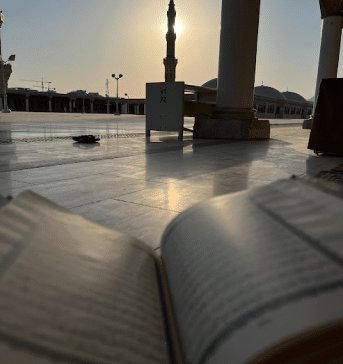 t me (offspring) from the righteous.” So We gave him the glad tidings of a forbearing boy. And when he (his son) was old enough to walk with him, he said: “O my son! I have seen in a dream that I am slaughtering you (offer you in sacrifice to Allah), so look what do you think!” “O my father! Do that which you are commanded Insha Allah (if Allah wills), you shall find me of the patient.”
t me (offspring) from the righteous.” So We gave him the glad tidings of a forbearing boy. And when he (his son) was old enough to walk with him, he said: “O my son! I have seen in a dream that I am slaughtering you (offer you in sacrifice to Allah), so look what do you think!” “O my father! Do that which you are commanded Insha Allah (if Allah wills), you shall find me of the patient.”
Then when they had both submitted themselves to the Will of Allah and he had laid him prostrate on his forehead (or on the side of his forehead for slaughtering); and We called out to him: “O Ibrahim! You have fulfilled the dream (vision!” Verily! Thus do We reward those who perform good deeds, totally for Allah’s sake only. Verily, that indeed was a manifest trial and We ransomed him with a great sacrifice (a ram) and We left for him (a goodly remembrance) among generations (to come) in later times. “Salamun (peace) be upon Ibrahim!” Thus indeed do We reward the Muhsineen (good doers). Verily, he was one of Our believing slaves.” [37:99-111]
A few days later, Prophet Ibrahim (AS) was sitting outside his tent thinking about the command of Allah SWT and the life of his son. While on one end his heart was heavy due to his love for, and faith in Allah SWT, the tears in his eyes reminded Prophet Ibrahim (AS) of his love for his firstborn, Prophet Ismail (AS).
Prophet Ibrahim (AS) decided to discuss his dream with Prophet Ismail (AS), who obediently, selflessly, and bravely advised his father to fulfill the wish of the Almighty. So, the next day, Prophet Ibrahim (AS) and Prophet Ismail (AS) went to the plain of Arafat carrying only a rope and knife.
Upon reaching, while the brave father was tying the hands and legs of his son so that he may not struggle, Prophet Ismail (AS) asked Prophet Ibrahim (AS) to blindfold himself so that he may not witness the suffering of his son.
Prophet Ibrahim (AS) did exactly as he was told. He blindfolded himself, took the knife, said “Allahu Akbar” out loud, and performed the act.
However, to his surprise, when Prophet Ibrahim (AS) took off the blindfold, he found out that he had actually sacrificed a lamb that Allah SWT had miraculously placed in front of him and Prophet Ismail (AS) stood beside his father, unharmed. (Ibn Kathir)
Even though at first Prophet Ibrahim (AS) thought that something had gone horribly wrong and he had disobeyed the order of Allah SWT, a voice told him that the Almighty looks after his followers and he shouldn’t worry.
The Prophethood of Ismail (AS)
Being the son of Prophet Ibrahim (AS), Allah SWT rewarded Prophet Ismail (AS) with the duties of prophethood.
Throughout his life, Prophet Ismail (AS) guided the people of Amalika in Yemen and spent over fifty years of prophethood conveying the divine message of Allah SWT to the idolaters.
Allah SWT in the Quran states, “And mention in the Book (the Quran) Ismail (Prophet Ismail (AS)). Verily! He was true to what he promised, and he was a Messenger, (and) a Prophet. And he used to enjoin on his family and his people As-Salat (the prayers) and the Zakat, and his Lord was pleased with him.” [19:54-55]
Where Was Prophet Ismail (AS) Born?
Prophet Ismail (AS) was born to Prophet Ibrahim (AS) and his second wife, Hajar (RA) in 1800 BC in the city of Palestine (formerly Canaan).
Even after several years of marriage, Prophet Ibrahim (AS) and Sarah (RA) were unable to conceive. Seeing her husband longing for a child and getting older, Sarah (AS) advised Prophet Ibrahim (AS) to marry their servant, Hajar (RA).
Soon after getting married, Allah SWT blessed the couple with a beautiful baby boy, Prophet Ismail (AS). Allah SWT mentions the wish of Prophet Ibrahim (AS) in the Quran, “O my Lord! Grant me a righteous (son)!” Answering the wish of his beloved prophet, He (SWT) states: “So We gave him good news of a forbearing son.” [37:100-101]
The 86-year-old father, Prophet Ibrahim (AS) was overjoyed with the birth of his first son and thanked Allah SWT for answering his prayers and blessing them with a miracle.
Where Is Prophet Ismail (AS) Buried?
According to Islamic history, Prophet Ismail (AS) had 12 sons and many daughters who migrated to different parts of the Arabian Peninsula with an aim to spread the message of Allah SWT.
Prophet Ismail (AS) died at the age of 130 or 137 years in Makkah, Saudi Arabia. He is buried alongside the grave of his mother, Hajar (RA) in Masjid al-Haram. (Ibn Kathir)
What Was Prophet Ismail’s (AS) Wife (AS) Name
Prophet Ismail (AS) had two wives, Amarah and Halia. He didn’t have them at the same time. Instead, Prophet Ismail (AS) divorced Amarah and married Halia. Prophet Muhammad (PBUH) tells the life story of Prophet Ismail (AS) as follows:
Then she (Hajar (RA)) drank water and suckled her child. The angel said to her: “Don’t be afraid of being neglected, for this is the House of Allah SWT which will be built by this boy and his father, and Allah SWT never neglects His people.”
The House (Kaaba) at that time was on a high place resembling a hillock, and when torrents came, they flowed to its right and left. She lived there till some people from the tribe of Jurhum (or a family from Jurhum) passed by as they (the Jurhum people) were coming through the way of Kada.
They landed in the lower part of Makkah where they saw a bird that was known to fly around water and not leave it. They said: “This bird must be flying around water, though we know that there is no water in this valley.”
They sent one or two messengers who discovered the source of water and returned to inform them of the same. So they all came towards the water. Ismail’s (AS) mother was sitting near the water. They asked her: “Do you allow us to stay with you?” She replied: “Yes, but you will have no right to possess the water.”
They agreed to that. Prophet Ismail’s (AS) mother was pleased with the whole situation as she used to enjoy the company of people, so they settled there, and later on they sent for their families who came and settled with them so that some families became permanent residents there.
The child (Ismail (AS)) grew up and learned Arabic from them and (his virtues) caused them to love and admire him as he grew up. When he reached the age of puberty, they made him marry a woman from amongst them.
After Prophet Ismail’s (AS) mother had passed away, Prophet Ibrahim (AS) came after Prophet Ismail’s (AS) marriage in order to see the family that he had left. However, he did not find Ismail (AS) there. When he asked Prophet Ismail’s (AS) wife about him, she replied: “He has gone in search of livelihood.”
Prophet Ibrahim (AS) then asked her about their way of living and their condition, to which she replied: “We are living in misery; we are living in hardship and destitution.”
Prophet Ibrahim (AS) said: “When your husband returns, convey my salutations to him and tell him to change the threshold of the gate (of his house).”
When Prophet Ismail (AS) came, he seemed to have felt something unusual, so he asked his wife: “Has anyone visited you?”
She replied: “Yes, an old man of such and such description came and asked me about you and I informed him and he asked about our state of living and I told him that we were living in hardship and poverty.”
Hearing this, Prophet Ismail (AS) said: “Did he advise you anything?”
She said: “Yes. He told me to convey his salutations to you and to tell you to change the threshold of your gate.”
Prophet Ismail (AS) said: “It was my father and he has ordered me to divorce you. Go back to your family.”
Taking his father’s advice, Prophet Ismail (AS) divorced her (Amarah) and married another woman (Halia) from among them (Jurhum).
The Messenger (PBUH) of Allah SWT continued:
“Then Prophet Ibrahim (AS) stayed away from them for a period as long as Allah SWT wished and called on them again but did not find Prophet Ismail (AS). So he came to Prophet Ismail’s (AS) wife and asked her about Prophet Ismail (AS).”
Halia said: “He (Ismail) has gone in search of our livelihood.”
Prophet Ibrahim (AS) asked her about their sustenance and living: “How are you getting on?” .
She replied: “We are prosperous and well off (we have everything in abundance).” Then she thanked Allah.
Prophet Ibrahim (AS) said: “What kind of food do you eat?” She said: “Meat.”
Ibrahim (AS) said: “What do you drink?” She said: “Water.”
He said: “O Allah SWT! Bless their meat and water.”
Prophet Muhammad (PBUH) added: “At that time they did not have grain and if they had grain he would have also invoked Allah to bless it. If somebody has only these two things as his sustenance, his health and disposition will be badly affected unless he lives in Makkah.”
“Then Prophet Ibrahim (AS) said to Prophet Ismail’s (AS) wife: “When your husband comes, give my regards to him and tell him that he should keep firm the threshold of his gate.”
When Prophet Ismail (AS) came back, he asked his wife: “Did anyone call on you?”
She replied: “Yes, a good-looking old man came to me,’ so she praised him and added: “He asked about you and I informed him that we were in a good condition.”
Prophet Ismail (AS) asked her: “Did he give you any piece of advice?” She said: “Yes, he told me to give his regards to you and ordered that you should keep firm the threshold of your gate.”
to this, Ismail (AS) said: “He was my father, and you are the threshold of the gate. He has ordered me to keep you with me.”
Which Prophet Lived the Longest in Islam?
According to Islamic scriptures, Prophet Noah (AS) was the prophet who lived the longest in Islam. Allah SWT in the Holy Quran states that the prophethood of Prophet Noah (AS) spanned over 950 years:
“And he stayed among them a thousand years (sanah) less fifty years (‘am).” [29:14]
However, when it comes to the interpretation of this verse (ayah), there’s a contradiction of opinion. Ibn Abi-Dunya narrated in az-Zuhd (no. 358) with his isnad from Anas ibn Malik (RA) that he said: “The Angel of Death came to Prophet Noah (AS) and said: ‘O longest-lived of the prophets, how did you find this world and its pleasures?’ He said: ‘Like a man who entered a room with two doors, and he stood in the middle of the room for a brief moment, then he went out of the other door.'”
On the other hand, according to Ibn Abbas (RA), Prophet Noah (AS) lived for 1050 years. With reference to the aforementioned verse, he states: “Allah SWT sent Prophet Noah (AS) (as a prophet) when he was forty years old, and he remained among them for one thousand years less fifty, calling them to Allah SWT; after the Flood, he lived for another sixty years, until the people increased in numbers and spread out.” (Tafsir ibn Abi Hatim)
Summary – Story of Prophet Ismail (AS)
The life story of Prophet Ismail (AS) is no less than a lesson to all Muslim generations to come. It teaches us that we are here to be tested by Allah SWT and to Him, we shall return.
The story of Prophet Ismail (AS) reminds us that this life is a test by the Creator, and in order to succeed in worldly challenges and be rewarded in the Hereafter, we should accept the commands of Allah SWT and follow them.
Through His Names
New course with
Ustadh Shabbir Hassan





